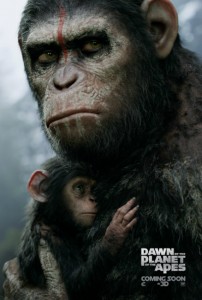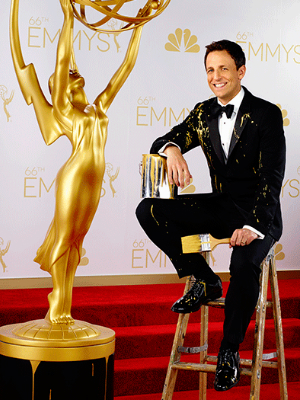
Do you remember the ending credits to Rise of the Planet of the Apes from three years ago? It showed graphics on how a deadly virus was sweeping across America and around the globe. The beginning credits for Dawn of the Planet of the Apes begins with those same graphics and then the story is fast-forwarded ten years.
Though technically a sequel, “Dawn” is actually a stand-alone film with only a few of the original cast members from the first movie. It is a whole new story based on the events that happened in the first film. Ten years have passed and the apes are living in peace in their own community that they built in the forest just on the other side of San Francisco’s Golden Gate Bridge. Their leader is Caesar (Andy Serkis), who is celebrating another son being born to him and his mate, Cornelia (Judy Greer). Some of the primate’s younger generation does not really know about they even got there in the first place and all they really know about humans are legends. It’s been at least two years since any ape has seen a human. Koba (Toby Kebbell) is still angry over the mistreatment he endured by the humans years ago while Caesar still has good memories of the human who smuggled him out of the testing lab and taught him how to read. It is an interesting message on how one can see the same world differently depending on how one is raised
On the other side of the bridge, the remaining humans, who were somehow immune to the deadly virus, live together in an uncertain world. Their leader of sorts is Dreyfus (Gary Oldman), the former Chief of Police for San Francisco. The younger residents too are uncertain about the community living across the bridge. And just like the younger apes, all they know about local history is what they are told from the older ones. The community’s power sources are dwindling and the only hope for human survival is to start up the power station located at the river dam…up in the woods. A brave Malcolm (Jason Clarke) offers to go and try to negotiate with the apes to allow the humans to start up the power station once again. A small group of volunteers join him including a nurse (the never-aging Keri Russell), Carver (Kirk Acevedo) who is just as untrusting of the apes as Koba is of the humans and Malcolm’s son, Alexander (Kodi Smit-McPhee).
Like the first movie, Dawn is tension-filled and yet it has a lot of messages about family. There are even shades of The Lion King. Both come to realize how similar the others are to their own families. Both humans and apes struggle with what they know in their hearts and what others tell them about the other community. It is a story about trust and deception. The movie raises the question, “Can both men and apes live together in harmony?” and explores whether it is wiser to try to negotiate with others or is it better to show force and conquer the others before problems start? Some in the religious community can also see the story as an example about how we see others outside of the church. Is it better to welcome them in or smile at them from a safe distance?
The scenes shown of the urban jungle forest are beautiful while the scenes of destruction of what is left of San Francisco are quite sobering. It isn’t exactly Mad Max, but it is getting there. The first twenty minutes or so feels as if one is watching a foreign film. The apes communicate with each other with hand gestures and what not. Subtitles are shown below. The 3D effect adds a nice touch. For a movie with such an unbelievable story line, Dawn is quite smart. Overall, it is very enjoyable. The violence isn’t especially bloody and swearing is kept to a minimum, but It may be too intense at times for younger viewers.

